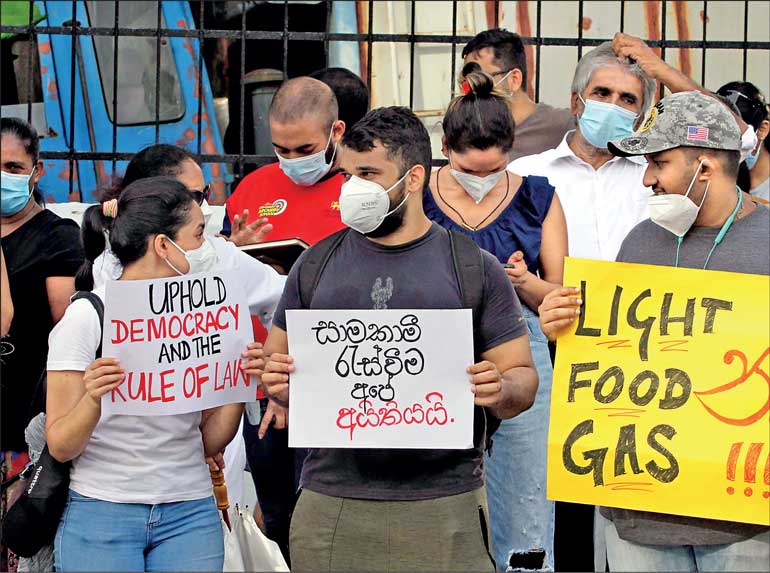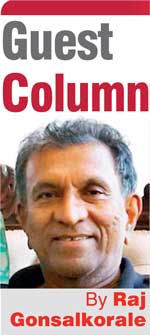Sunday Feb 22, 2026
Sunday Feb 22, 2026
Friday, 8 April 2022 00:00 - - {{hitsCtrl.values.hits}}

It is hoped that this so far silent and now vociferous mass of very ordinary folk, will let the politicians of all hues know that they do not believe that changing the pillow will address the fundamental economic problem that compelled them to take to the streets
The answer to ‘Whither Sri Lanka’ can be found in that old story of two deaf mutes, one carrying a bag, meeting another. The one with the bag is asked whither to? And the reply was coconuts in the bag – Sunday Leader
a bag, meeting another. The one with the bag is asked whither to? And the reply was coconuts in the bag – Sunday Leader
The problem facing Sri Lanka is an economic one. It has given way to a political problem. The entire country seems hell bent on solving the political problem without diverting their attention to the economic problem that is at the core of all that has gone wrong in the country. It’s a clear case of ‘koheda yanne, malle pol’.
Changing pillows at this stage will not cure the headache even if a new government headed by the Opposition takes over from the current regime, as the cure for the headache is rooted in an economic and financial management rescue plan. The Opposition is probably committing Hara Kiri by wishing to take over the government in the current poisonous environment. If the current Government is politically astute, it should happily pass on the poisoned chalice to the Opposition!
Politicians of all hues have shown that they have been unable to plan, introduce and manage a long-term economic policy that has as its core, strategies for debt reduction, increase in foreign exchange reserves, for import substitution and achieving a balanced budget.
Gas shortages, diesel shortages, power cuts, inflation, depreciation of the rupee and the rise in cost of living are all symptoms of a serious economic problem. They are not the causes of the problem. One can treat the symptoms by adopting temporary relief measures, and they need to be done to alleviate the immediate sufferings of the people. However, unless the root causes of the economic problem are addressed, the symptoms will recur and the country could go on providing indefinite relief measures and further aggravating the causes that created the problem in the first place.
In this context, what is needed urgently is an economic rescue plan with immediate, short to medium term deliverables and longer-term deliverables. No doubt, politics will be associated with such a plan as the country’s governance system is linked to democracy and a multi-party system. However, if an economic plan as suggested is developed by experts in the field of economics and other key areas associated with economics and financial management, and it is accepted by ‘all’ political parties as the way forward to overcome the current economic crisis, and long-term measures to prevent a similar crisis from occurring, it will not matter as to which political party or grouping is in power. The multi-party approach should be directed to the economic problem and the economic solution. They should all battle their political battle outside of the agreed economic solution.
Neither the President nor the Opposition parties appear to have understood the critical distinction between the two problems. The multi-party cabinet initiative of the President seems to have died before it gave birth. The Opposition’s uncoordinated and loosely coined together ploy to deprive the Government of a working majority in Parliament, with perhaps a plan to defeat the Government in a motion of no confidence, is a political plan that could succeed.
In such a plan, the public has to give thought as to who would form a government in the event of the current Government being defeated and whether possible contenders could be relied upon to address the crucial economic problem faced by the country. The past record of these would-be saviours is well-known, and it would be an affront to the intelligence of the public to entrust this responsibility to them.
One significant advancement in the country’s democracy brought about by the economic problem is an awakening of the political and civic consciousness of the public. While opportunistic protestations have been organised and have occurred, the spontaneous protestations by very ordinary people from all walks of life cannot be and should not be underestimated. This is a significant achievement as the voice of the ordinary people can no longer be ignored by politicians. Enough is enough has been the common voice of such protestations. A common thread amongst them has also been that they have made their views known about politicians of today in general, and that they do not have confidence in any of them.
In this context, it is hoped that this so far silent and now vociferous mass of very ordinary folk, will let the politicians of all hues know that they do not believe that changing the pillow will address the fundamental economic problem that compelled them to take to the streets. These ordinary people created a revolution never witnessed in Sri Lanka before. They should continue to voice their support for an intelligent, revolutionary economic solution that politicians will be compelled to accept and implement.
In conclusion, the following are suggested:
1.All people who are interested in an economic solution to the economic problem facing the country should advocate and campaign for a committee of experts drawn from the relevant sectors to develop an economic rescue plan with immediate, short to medium term and longer term strategies to address the problem. Such a plan should be at least of 10 years duration.
2.The plan should be presented to the public for comments and suggestions within a given timeframe.
3.A final draft of the plan then should be submitted to the Parliament for discussion and debate, with a provision that it has to be approved by consensus by all parties represented in the Parliament.
4.The approved plan then should be implemented by the government and periodic updates given to the public.
5.The plan should be reviewed on an annual basis by the committee who drafted it, with the committee taking the leadership to do the review and when and where necessary, seeking views from the public.
Meanwhile, it is hoped that all the ongoing protestations are directed towards seeking an economic solution to the economic problem facing the country and not a political solution to solve the economic problem.